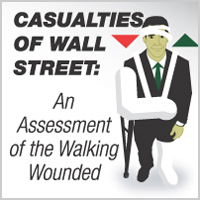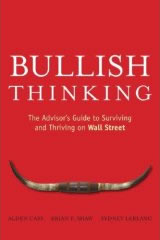 |
|
 |

|
Casualties of Wall Street: An Assessment of the Walking Wounded
Alden Cass
John Lewis
Ed Simco
|
| Casualties of Wall Street: Assessing the Walking Wounded |
 |
Introduction
It has long been known that Wall Street Stockbrokers (Account Executives) are exposed to highly stressful working conditions during their pursuit for affluence, which may interfere with their overall quality of life and occupational productivity. The job description for these Account Executives requires them to handle a great deal of personal responsibility and because the broker is usually paid on a commission basis, he or she must work to make as many trades in stocks and bonds as possible, in order to achieve success. Additionally, the threat of job uncertainty due to the success of on-line trading, the volatility of the contemporary market, the possibility of inflation or interest rate hikes, international market competition, and at the time of this investigation, the Y2K problem, have further complicated the job description for the account executive working in today’s market.
The ambiguity of their on-the-job decisions, coupled with the complex nature of their profession and the likelihood of experiencing failure, has facilitated a growing trend of increased personnel turnover, absenteeism, social withdrawal, and a deterioration of employees’ productivity, as well as their physical and mental health (Felton & Cole, 1963, Ivancevich & Matteson, 1980, Ganster & Schaubroeck, 1991, Greenberger, Strasser, Cummings, & Dunham, 1989). These negative personal outcomes have proven to be very costly for firms over the past twenty years because of the rapid growth of “psychiatric injury claims” and reports of “gradual mental stress” (Lubin, 1980). Poor decision making on the buying and selling of stocks and the cost of training new employees are also speculated to be substantial costs to firms at the present time.
|
|
 |
|
 |



